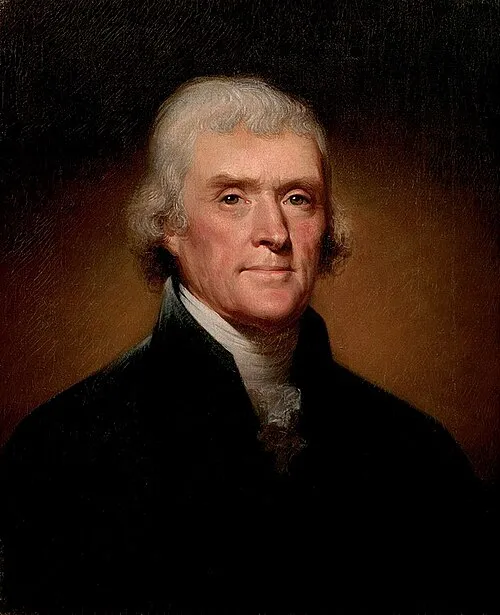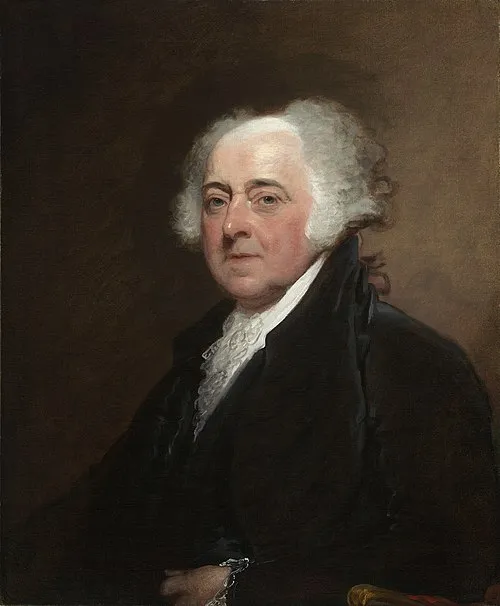
Full Name: Thomas Jefferson
Birth Year: 1743
Death Year: 1826
Occupation: Architect, Lawyer, Politician
Political Position: 3rd President of the United States
1826 – Thomas Jefferson, American architect, lawyer, and politician, 3rd President of the United States (b. 1743)
Early Life and Education
Jefferson was born into a prominent Virginia family and received an education that would set the foundation for his future endeavors. He attended the College of William and Mary, where he studied various subjects, including philosophy, mathematics, and law. He developed a keen interest in Enlightenment thinkers, particularly John Locke, whose ideas about government and natural rights greatly influenced Jefferson’s political philosophy.
Political Career and the Declaration of Independence
Jefferson's political career began in the Virginia House of Burgesses, but his most significant contribution came as the principal author of the Declaration of Independence in 1776. This document not only declared the thirteen colonies free from British rule, but it also articulated the fundamental principles of liberty and equality that would resonate throughout history. Jefferson’s eloquence in writing the declaration encapsulated his belief that all men are created equal, a sentiment that continues to be a cornerstone of American democracy.
Presidency and the Louisiana Purchase
During his presidency, Jefferson faced numerous challenges, including foreign relations and domestic policies. One of his most notable achievements was the Louisiana Purchase in 1803, which doubled the size of the United States and provided vast territories for exploration and settlement. This acquisition exemplified Jefferson’s vision of expanding a nation rooted in agrarian ideals and democracy. He sent explorers Lewis and Clark to chart the newly acquired lands, promoting scientific inquiry and the spirit of adventure.
Architectural Contributions
Apart from his political legacy, Jefferson was a gifted architect. He designed several notable buildings, including his own home, Monticello, in Virginia. Monticello is a remarkable expression of neoclassical architecture and reflects Jefferson's admiration for classical forms and his belief in the importance of beauty in public life. He also contributed to the design of the University of Virginia, which he founded in 1819, emphasizing the importance of education and development in the new republic.
Later Life and Legacy
After serving two terms as president, Jefferson retired to Monticello but remained engaged in public life. He founded the American Philosophical Society and continued to advocate for education and Enlightenment ideals. Jefferson passed away on July 4, 1826, the same day as the 50th anniversary of the Declaration of Independence, marking a poignant conclusion to his life.
The Legacy of Thomas Jefferson: An Enduring Influence
In the corridors of history, few figures resonate as profoundly as Thomas Jefferson. Born in 1743, this remarkable man emerged from the picturesque landscapes of colonial Virginia, destined to shape the very foundations of a nation. As the third President of the United States, his influence transcended mere political boundaries; he was an architect of ideals that continue to inspire generations.
From Humble Beginnings to Revolutionary Thinker
Jefferson’s journey began amidst the rolling hills and sprawling plantations of Virginia. Raised in a wealthy family, he was exposed to education early on yet who could have predicted that this inquisitive boy would grow into a man who would draft one of history's most significant documents? At age 33, he penned the Declaration of Independence a bold proclamation that declared the colonies free from British rule.
This act was not merely revolutionary; it ignited a flame in hearts across America and beyond. However, despite facing criticism and skepticism from contemporaries, Jefferson stood firm in his beliefs. Ironically, while he advocated for liberty and equality on paper, his own life was marred by contradictions including his ownership of enslaved individuals.
The Architect Behind American Ideals
Jefferson's vision extended beyond politics; he was also an accomplished architect. His fascination with design transformed Monticello a grand estate that reflected his Neoclassical ideals into both a home and a symbol of his innovative spirit. He famously stated that architecture is “the art which so disposes and adorns the edifices raised by man.” Yet perhaps it’s ironic that while creating such beauty at Monticello, its foundation relied on practices utterly at odds with those values.
A Political Chess Game: The Presidency
When Jefferson ascended to the presidency in 1801 amid national turmoil and having ousted John Adams it marked more than just a transfer power; it represented an ideological shift toward agrarianism over Federalism. This wasn’t simply about governance but rather defining what it meant to be American during a period rife with tension between competing factions.
However, this transition did not come without challenges foreign relations loomed large on Jefferson’s agenda. For instance, when tensions rose with Britain over trade restrictions leading up to war… instead opting for diplomacy over conflict might have been perceived as weakness by some! Yet perhaps this cautious approach saved countless lives a testament to his belief in reasoned discourse above bloodshed.
The Louisiana Purchase: A Bold Move
Inevitably landing one major triumph during his presidency the Louisiana Purchase expanded America's territory significantly while doubling its size overnight! This deal with France opened vast expanses for exploration yet stirred controversy among Jefferson's critics who questioned constitutional authority here... Did he bend or even break rules set forth earlier? Who knows!
Cultural Contributions Beyond Politics
While many remember him solely for political achievements or architectural genius… arguably less recognized are contributions made towards education and cultural development within America itself. Founding institutions such as University Of Virginia showcased commitment toward enlightenment through knowledge dissemination whilst encouraging critical thinking amongst young minds.






